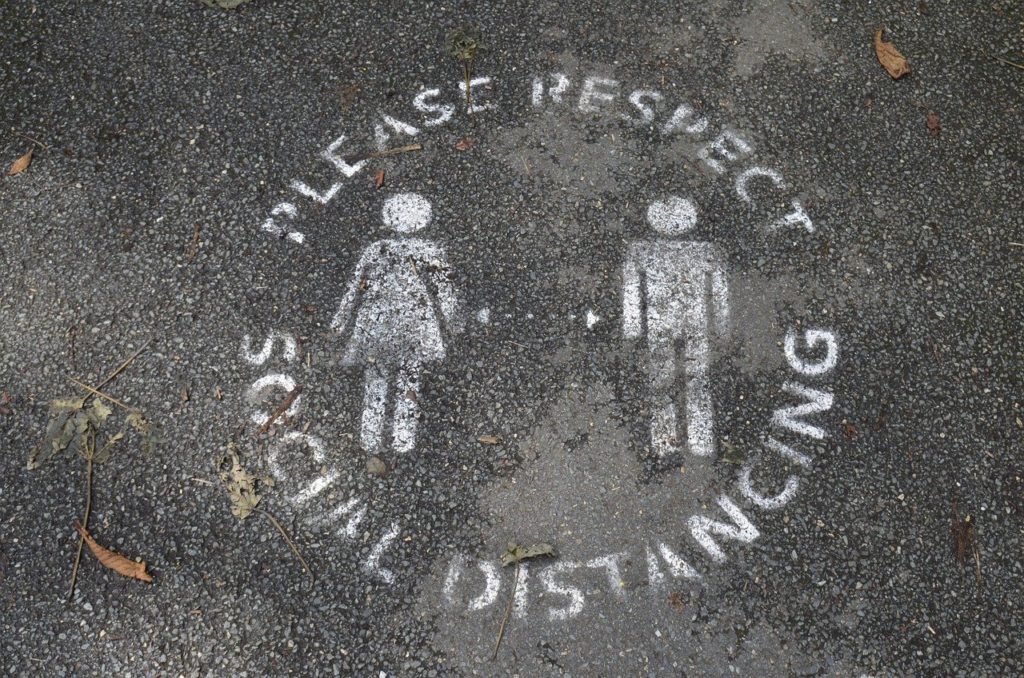Janet Bowstead, one of our Data Impact Fellows, discusses how networking opportunities, a vital part of developing research and impact communities, have been changed by Covid-19.
After a year of complying with restrictions to try to limit the spread of the COVID-19 virus, we have all been thinking about our contacts with other people. Thinking about what we touch, how close we pass other people, how we share space, and how far our breath can travel.
We have become familiar with the phrase “socially distanced” as well as the criticism that it should be more about being “physically distanced” whilst making sure we do our best to continue to be a social species – with all that is positive about societal connections.

Image: Social distancing stencil on ground
We have re-thought all our ways of connecting: what is possible online and virtually, what we need to do live – in real time – and what we can record and repeat.
Some online ‘meetings’ are positive interactions – enabling connections across time zones that would not be possible if we needed to travel to meet. But others can feel very isolated – unconnected – especially when the technology lets us down. After over a year, we are becoming more aware of the limitations to new connections – people we have never actually met – and other connections that have been difficult to maintain at their previous depth. The past year has changed so many of our relationships.
In terms of thinking about research impact, relationships are often vital: the serendipity of a chat over coffee during a conference, practising the plain speaking of an ‘elevator pitch’ when you have 30 seconds to explain your research to a policy- or decision-maker.
Such ‘networking’ can happen by chance, but it is also something researchers are advised to think about and plan. This can involve scrutinising the attendance list before a conference to identify a key leader you would like to hear speak – or ask a question of – and making the best use of those all-important name badges spotted across a crowded room.
So, what about networking in a time of pandemic?
For some people it has been a bit like a horrible game of ‘musical chairs’ where the music has stopped and you have to sit where you are until it starts again…. except it never seems to start. For others, it has had more positive aspects: I have heard established Professors saying how much they are enjoying not having to go to conferences and events – glad not to be travelling for all those brief encounters and somewhat repetitive socialising.
But, these are the people who already have so many contacts and networks – resources that they can draw upon for years – and do not feel the need for any new connections. If they want to publicise their research, they can use their usual contacts; and they will be readily approached to set up new projects, to speak on panels and to take part in advisory groups.
However, newer researchers – who may also be working on more marginalised topics and with often-excluded groups – may be just starting to build their networks and may be losing out from the lack of informal and random connections that happen in real life.
At the end of an online conference session, it is very difficult to connect with a couple of individuals to continue the discussion; and the meeting software can cut conversations off mid-sentence. Amongst a screen of faces and names, it is a challenge to keep track of who is participating, and who might be frozen out. And so, where research requires networks and relationships to achieve influence, there is a risk that these times entrench the advantages of the already-connected, and isolate those on the margins.
Not only does this affect individuals – and their research careers – it affects the impact of new knowledge and ideas from the research. It highlights the risk of defaulting to established voices and networks – the structurally well-connected – and systematically excluding those who are trying to build alternatives.
About the author
Janet Bowstead is one of our #DataImpactFellows. Janet is a Postdoctoral Research Fellow at the Royal Holloway, University of London.
She is a feminist academic with a professional background in frontline, policy and coordination work on violence against women. Her research is interdisciplinary in nature, across geography, social policy and sociology; integrating quantitative, spatial, qualitative and creative methods. She has research articles in journals in geography and wider social sciences and social policy. Janet is currently a British Academy Postdoctoral Research Fellow in Geography at Royal Holloway, University of London.
